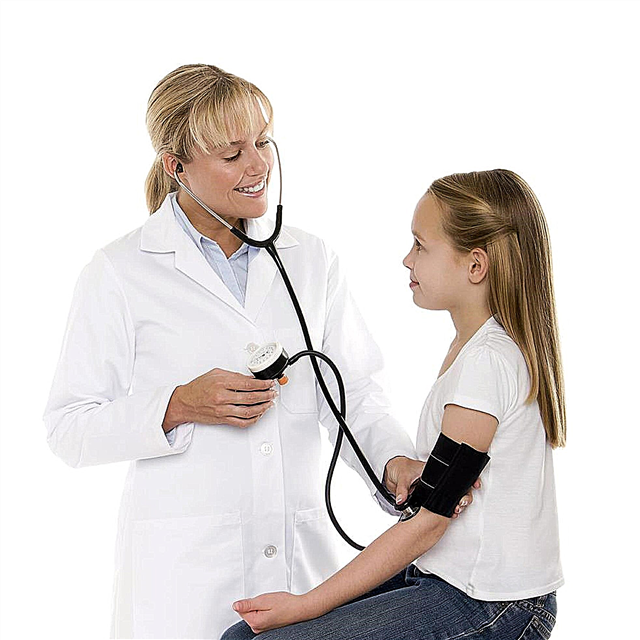33 weeks pregnant. Fruit weight 1900-2000 g, full height 42-43 cm. The mineralization of the fetal bones is almost complete, but the skull still consists of bones and cartilage joints. It is important for mom to count fetal movements from time to time and saturate her diet with fatty acids. Wrist syndrome can occur even without strenuous hand work.

How many months?
Thirty-third obstetric week (aka 31st from conception) is the ninth lunar month of your pregnancy. How doctors calculate deadlines, especially in controversial situations - read here.
Fetal development

Growing and gaining weight is the main task for the fetus. Many organs and systems are already fully functional:
- The heart has been pumping blood for several months now and makes 120-160 beats per minute.
- The baby swallows the amniotic fluid, and the kidneys convert it into urine and remove it from the body.
- The endocrine glands produce various hormones, which after childbirth will regulate the child's life processes.
- The brain "commands" every movement of the fetus. Any of them is reflexive. The baby will gradually learn to control its muscles over the years after giving birth.
The layer of subcutaneous fat continues to thicken, and the original fluff disappears throughout the body. The hair on the head thickens a little, but it is still soft and fluffy.
Some bodies are not yet involved. The baby's lungs are at rest. But the diaphragm rises and falls, this is also training. There is nothing to look at the baby in the womb, it is dark there, but the muscles of the eye and eyelids are already ready for their activity.
Some babies weigh more than two kilograms at the thirty-third week. At the same time, the norm of weight is not violated, because newborns also differ in parameters. The twins are probably not as tall and lighter in weight. Everything here is individual. On average, the fetus gains 15-25 grams in weight every day.

Many babies at this time are already taking the optimal position for the upcoming birth: head down. The legs and arms are crossed. But if the doctor has established a different presentation, there is nothing to worry about yet. Just don't wear a bandage. It helps you, supports your belly, but prevents the fetus from moving and may prevent your baby from rolling over properly.
The bones and cartilage of the fetus continue their mineralization due to calcium, which comes from the mother's food. However, the children's skull does not ossify; soft and flexible cartilaginous joints will remain in it until the very birth. Why is this happening?
Very soon, the child will have to go through the birth canal of the mother (of course, if a cesarean section is not planned). The head is the largest part of the baby's body. To facilitate passage, the bones of the skull shift during childbirth and slightly reduce the diameter of the baby's head.
Good to know. Finally, the cranial bones harden already in one-year-old babies. It is no coincidence that there are fontanelles on the crown of babies' heads - tiny places where there is no bone tissue and a pulse is felt.
Stirring
Now it is an important indicator of your baby's condition. The doctor may ask you more than once to count the number of movements. To do this, choose a quiet time of the day, make yourself comfortable (sitting or lying, just do not fall asleep) and count the tremors. There should be at least ten of them in two hours. If you counted less - tell your doctor about it, he will prescribe CTG to check the fetal heart activity and ultrasound to diagnose its general condition.
Some mothers feel that their stomachs seem to twitch from the inside, but there is no tension, as in contractions. It is generally accepted that this is how fetal hiccups manifest. Doctors associate this phenomenon with the ingestion of amniotic fluid. Perhaps the hiccups do not give the fetus such unpleasant sensations that it causes in a child or an adult.
Mom's well-being and feelings

Many women at 33 weeks admit that pregnancy has become a completely normal condition. If there are no complications, then some of the inconveniences of the state are compensated for by emotional peace, the ability not to go to work / study and the joy of waiting.
You may experience heartburn or constipation any day. If you still do not know how to cope with these conditions, read about it in the “Recommendations” section at the end of the article.
At this time, you may find yourself with carpal tunnel syndrome, even if you have not typed for a long time on the keyboard. You may have external and / or internal edema. Unwanted accumulations of fluid interfere with the full flow of blood through the vessels, hence numbness and pain. Shake your hands more often, arrange them comfortably in a dream, do not keep them lowered for a long time. An elastic bandage on the wrist or special orthopedic bandages will also help.
Recurrent swelling of the legs appears after a long walk or standing. For the same reason, dilated vessels may appear that are visible under the skin.
Attention. Persistent edema (appears constantly and does not go away for a long time) is a much more dangerous condition, as well as a sharp weight gain of more than 300-500 grams per week. This may indicate late toxicosis, especially if you have high blood pressure. Read about this complication of pregnancy in the article on toxicosis.
Premature birth
In the normal course of pregnancy, babies should be born on time or just a little earlier. If the child is born now, he will need a special incubator and professional medical assistance.
With multiple pregnancies, babies are often born much earlier than the fortieth week. If you are expecting twins or even triplets, be prepared for this.
Attention: fatty acids
Usually, pregnant women are strongly discouraged from eating high-fat foods. But omega-3 fatty acid is a very valuable element of the fetus's nutrition. This natural chemical compound is responsible for the development of the so-called cognitive abilities of the child. These include thinking, attention, memory, imagination, and the ability to understand. Even in the first weeks of pregnancy, you may often hear advice to include fatty fish in your diet. They contain more important acids. In late pregnancy, their value increases several times.
What if you absolutely hate fish or are allergic to seafood? Options are possible. Your diet should include eggs, almonds, walnuts. Linseed oil is also good. You don't need to pour it into a spoon and drink it through force, like a nasty medicine. Season salad with it, especially if it's made from grated carrots.
Discharge and pain
Nothing changes here. Light scanty vaginal mucus (clear or white) is the norm. An admixture of pus, a cheesy consistency, an unpleasant odor signal pathological processes in the genitourinary system. Treatment is prescribed only by a doctor.
Particularly dangerous are abundant watery discharge - cracks, even ruptures of the fetal bladder are possible. Admixture of blood or real bleeding is another danger sign. Call an ambulance as you can give birth prematurely.
Normally, nothing should hurt you. Unpleasant sensations of tension, heaviness, tightness of the abdomen, back, ribs and lower back are common physiological manifestations of pregnancy. But if anything really hurts, be sure to notify your doctor, and if the pain is intense, seek emergency help.
What is placental abruption?
This is a rare but dangerous complication of the third trimester of pregnancy. There are only 1-1.5% of such cases, but it is necessary to know about them.
The placenta normally begins to separate from the wall of the uterus at the last stage of labor, when the baby has already been born. If the detachment occurs earlier, this is a pathology. The main symptoms are:
- severe abdominal pain;
- vaginal bleeding;
- a change in the shape of the abdomen - this is due to the accumulation of blood secretions inside.
If the placenta is partially exfoliated and a small part of it, the mother still has a chance to deliver the pregnancy. With significant or complete separation, the child is at risk of death. The fetus simply ceases to receive enough oxygen through the placenta and umbilical cord and dies from suffocation.
If you have noted the listed symptoms, immediately call an ambulance. It is possible that doctors will be forced to induce labor or even perform a caesarean section to save your child's life.
Maternity clinic attendance calendar
Usually pregnant women see a doctor every two weeks. A couple of days before the visit, you need to take blood and urine tests for several indicators, the doctor always writes out the directions at the previous visit.
If for some reason you were not fully examined - you missed a scheduled ultrasound scan or tests, they can be prescribed this week. During an ultrasound examination, the doctor will check various physical parameters of the fetus (circumference of the head, chest, abdomen, symmetry of the length of the limbs). And also - the state of the placenta and the amount of amniotic fluid.
As additional examinations, you may be advised to undergo cardiotocography and dopplerometry.
Photos tummies
Recommendations
[sc: rsa]
- Follow your usual diet plus recommendations for increasing the amount of fatty acids in the diet.
- Do not drink tea or coffee with food, these drinks decrease the absorption of dietary iron.
- If you suffer from heartburn, drink jelly, do not forget about cereals.
- To avoid shortness of breath, move slowly, allocate a large amount of time for any hikes and trips. In no case should you give up physical activity, otherwise unpleasant phenomena will increase.
- In case of constipation, the diet must necessarily contain prunes, which perfectly stimulates contractions of the intestinal muscles.
- If your doctor has determined that you may have or are already developing hemorrhoids, practice washing regularly with warm water.
- Eliminate cramps of the calf muscles with a shin massage. It is also recommended to pull on the toes of the foot that you are bringing.
- Take good care of your belly, buttocks, thighs and breasts. Use any cream or lotion that is designed to fight stretch marks. This is especially important if your belly skin itches every now and then.
- If you have significant colostrum secretions, be sure to use bra pads and change them regularly, otherwise inflammation may develop in a humid environment.
- Low water, expectation of twins, low placenta and the threat of premature birth are contraindications for intimate life. In all other cases, careful sex is allowed.
- If you have fears of childbirth, visit a psychologist, tell your doctor about your fears, or just talk to friends, ask for their advice and support.
- In later stages, the nasal mucosa often swells without signs of a cold (rhinitis of pregnancy). Do not use vasoconstrictor drops. Moisturize your nasal mucosa often, and keep your home humid well.
We also read:a complete list of things for a newborn baby
There is very little left before the birth. Be happy and strong to give birth to a healthy and strong baby.
← Week 32 Week 34 →



